Here are the 85+ startups that launched today at Y Combinator’s W19 Demo Day 1
Y Combinator’s incubator classes have gotten huge.
With over 200 companies, the Winter 2019 class is by far YC’s largest yet. Meanwhile, the incubator prepares to shift its headquarters from Mountain View to San Francisco.
It’s so large, in fact, it’s had to change up the way it does Demo Day. Rather than all pitches happening on one stage, they were split across two stages (the “Pioneer” and “Mission” stages) running in parallel. So even if you were in the building, you couldn’t see all the pitches in person.
We were there — and as we do with each class, we’ve brought back our notes on everything we saw. Here are the 85+ companies that pitched today. Come back tomorrow for Day 2!
Pioneer Stage:
Career Karma: Hundreds of millions of people will need to change jobs in the coming years. Career Karma gives them a placement quiz and gets them accepted at coding bootcamps and other training programs that pay the startup $1000 per student. With income sharing agreements growing in popularity, plenty of job skill providers will be willing to pay to enroll the highest potential students.
VanGo: An on-demand ride service for getting your kids and teens around. The founders say that, because “moms trust other moms”, 85% of drivers on their service are moms and all of them are women. They plan to expand into other verticals to help parents down the road.

Team Mobot: Simulated user interface testing doesn’t catch all the bugs and can be complex for less tech savvy companies to perform. Team Mobot offers a fleet of robots that physically test any app’s UI on real devices to perform QA testing and spot bugs. Team Mobot’s fleet learns over time to increase accuracy, and the startup plans to invade the Internet Of Things and medical device verticals next.
Bento Club: Cheaper lunch delivery for office workers. Customers pre-order food from a select set of restaurants, and Bento picks it up and brings all orders to a shared pickup spot within one block of the customer’s office. 38% of customers are coming from referrals.
Basilica: Most teams trying to build artificial intelligence systems don’t have enough data, and that data can be expensive to collect. Basilica says its transfer learning method allows businesses to create accurate AI with just 1000 data points instead of 1 million. Basilica generates network effect by using data from across its clients to improve efficiency for each vertical that teams will need to keep up with Google.
Keynua: In Latin America, signing documents requires tedious identity verifications. With Keynua you record a short video to verbally agree to a document, and they use existing records to verify your identity. This team’s previous product (Cinepapaya) was acquired by Fandango in 2016.

Lumos: Doctors use Google 40X more than professional tools for finding medical information, but Google is full of ads and results are meant for patients not doctors. Lumos offers a medical Q&A search engine for doctors who pay $15 per month. A trial at UPenn saw 50% of the med students using Lumos each day within weeks of launch. Lumos says it has more potential business opportunities based off understanding what studies and info doctors trust, and having access to them at critical decision points during treatment.
Traverse Technologies: Traverse uses software to identify potential sites for wind and hydro power generation. The company then buys and resells those sites. They estimate that a plot that they buy for $750k can be resold for $5M. The currently have about $50M worth of Letters of Intent.
Basement: A social network for your close friends. Feed broadcasting social networks feel impersonal, and inevitably bloat with distant acquaintances you’re shy about sharing with. Basement is designed for college students and grads to just add their best friends. It offers Instagram-style posting tools, but the intimacy leads to comment threads that feel more like WhatsApp chat. Basement will have to get users to break the social contract of courtesy so they don’t friend the wrong people, but has a chance to be where Facebook wants to go.
CosmicJS: A drop-in, easier to manage alternative to WordPress. The company says that KFC, MLB, and Dailymotion are already customers. Currently making roughly $10k in monthly recurring revenue, and they say that’s growing about 15% monthly.
Ravn: Looking around corners is one of the most dangerous parts of war for infantry. Ravn builds heads-up displays that let soldiers and law enforcement see around corners thanks to cameras on their gun, drones, or elsewhere. The ability to see the enemy while still being behind cover saves lives, and Ravn already has $490,000 in Navy and Air Force contracts. With a CEO who was a Navy Seal who went on to study computer science plus experts in augmented reality and selling hardware to the Department Of Defense, Ravn could deliver the inevitable future of soldier heads-up displays.
54gene: 54gene aims to be 23andMe for Africa. The company says that competitor data is limited because their users are mostly white. By focusing on Africa, the company can help detect and identify DNA markers that might otherwise go overlooked. Co-founder Abasi Ene-Obong has a PhD in cancer biology from the University of London.
Slapdash: Enterprise apps run slow and it can be tough to find files or messages across them. Slapdash creates a desktop software-speed container in which workers can run all their office software like Slack, Dropbox, Asana, Salesforce, and Google. Users can search across all their apps and be more productive, luring SaaS subscriptions from their employers.
YourChoice: Male contraceptive pill. With “two of the world’s leading sperm physiologists”, YourChoice says they’ve created a pill thats 100% effective with “no side effects” by targeting the ABHD2 and ANT4 proteins in sperm. They’re also working on a hormone-free contraceptive pill for women.
AccioJob: Only one-third of India’s college graduates get placed in jobs because their schools often only expose them to local recruiters. AccioJob charges colleges $10,000 per year to place their students in jobs, and charges employers per placement. Since it gains student contact info and grades, AccioJob can become the gateway to the best Indian college grads as more students from the country begin to enroll.
CentaurLabs: Hires doctors to label medical imagery datasets at scale, which can then be used to train AI. In the future, they’re aiming to build a diagnosis system to provide second opinions for doctors and patients.
Travelchime: Planning travel requires cobbling together Google Docs, maps, blogs, friend recommendations, inspiration apps, and booking sites. Travelchime combines travel planning tools into a Google Doc-style interface that automatically suggests contextual information and places popular amongst travel writing that it’s indexed. Users can then book from Travelchime, which hopes it can build a more helpful version of TripAdvisor.
Seawise Capital: Trade loans for exporters in India. The founders say they make 10% on every loan, and have taken on $550k in loans in the past 6 weeks. They plan to raise $5M in debt by Q3 2019, and $25M in debt by Q1 2020.

PerShop: Shopping online can be frustrating because you’re either hopping between individual brands without comparative pricing, seeing too many irrelevant products on aggregators, or can’t checkout on social apps. PerShop is a personalized shopping site that only recommends you items from your favorite brands, in your size, in your price range. Eventually it plans to sell personalized, targeted ecommerce ads. PerShop gets smarter as people use it to buy or just for entertainment.
Prometheus: Removes CO2 from the air to make gasoline. They say they can make gasoline for about $3.00 per gallon. Whereas past attempts required massive distillation columns, founder Rob McGinnis says he was working with carbon nanotube membranes when he discovered a cheaper way to do it with much less real estate.

Unicorn: Scooter companies that rent by the minute lose 2% of their fleet per day to damage and theft, and that means customers don’t have a safe scooter available when they want one. Unicorn rents scooters by the week or month and is already profitable. Vehicles aren’t left outside overnight and spend more time rented, while customers know there’s a scooter available for them without having to buy one outright. Unicorn’s founder started Tile and now he wants to build a better unit economics business than Lime and Bird.

Loonify Space: A bespoke launch system meant specifically for carrying small satellites into orbit. A balloon carries rocket to 35km and launches it mid-air. They have Letters of Intent for 155 satellite launches, worth a total of roughly $77M. They intend to have their first launch on May 9th.
Supernova: Programming apps based on design mockups can be tough internally, but expensive and hard to maintain if outsourced. Supernova converts designs into production-ready code that follows best practices so it’s easy to update. Supernova’s AI can understand a product’s purpose and distinguish between navigation elements, buttons, and more. As more businesses try to modernize with tech products, Supernova could let them focus on their utility rather than computer science.
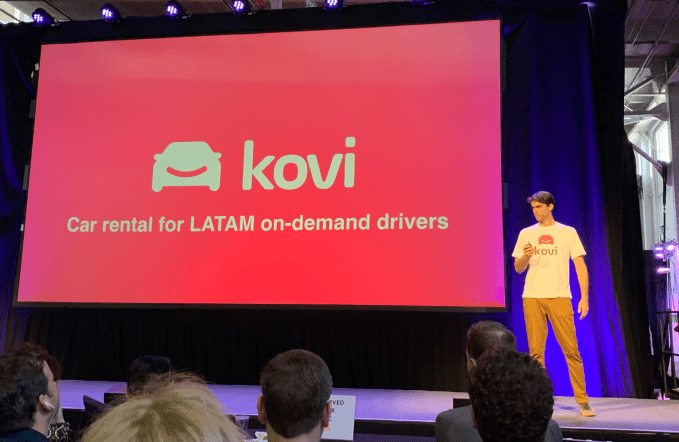
Kovi: Provides rental cars for on-demand drivers in Latin America. They currently have around 300 cars on the street, with 3,000 rental requests this year. The company estimates that 70% of drivers in Latin America rent/lease their vehicles.
Deel: 20 million international contractors work with US companies but it’s difficult to onboard and train them. Deel handles the contracts, payments, and taxes in one interface to eliminate paperwork and wasted time. Deel charges businesses $10 per contractor per month and a 1% fee on payouts, which earns it an average of $560 per contractor per year. As the globalization megatrend continues, businesses need better remote HR tools.
COUTURME: Custom, AI-designed wedding/formal dresses. The customer inputs their preferences, the software generates options, and the dress is produced and shipped within 30 days. It went live in January, and has been growing at roughly 15% weekly since. Co-founder Yuliya Raquel previously founded plus-size designer fashion company IGIGI.

Instapath Inc: Cancer biopsies can take a week to get you your results. Instapath is building a fully-automated pathology lab that can test a tissue sample and provide a diagnosis within five minutes while you’re still at the doctor’s office. This eliminates agonizing waiting periods and can get users treated more quickly. Instapath charges $200 per procedure, has already processed 500 biopsies, and claims to be on the path to FDA clearance in 9 months.
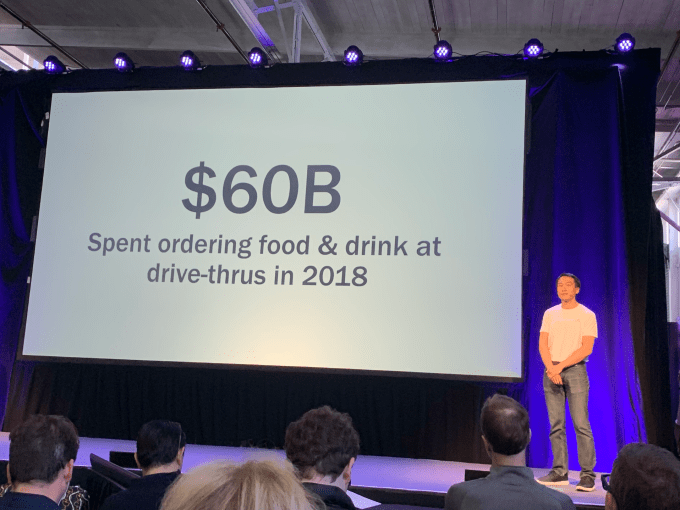
Bensen: Bensen wants to replace the drive-thru window by allowing restaurants to receive orders via voice assistants like Siri, Google Assistant, and Alexa in the car.. It’ll launch in two restaurant chains later this year, with Letters of Intent from companies with 800 locations. They’ll charge $3000 per year per location.
Socrates Intelligence: There’s huge demand for reading in China but just 1 library per 480,000 citizens. Socrates Intelligence is the Netflix-style mailing business for books in China. For $56 per year, users can rent up to 3 books and get them within 48 hours. The startup already has 10,000 subscribers and plans to go after ebooks, audiobooks, and magazines next to become the ‘rent everything store’ for China.
Overview: Many factories use massive robots to manufacture goods overnight, but there’s not always someone watching. If something goes wrong but goes undetected, the robots can physically destroy themselves. Overview uses cameras and AI to monitor manufacturing robots, shutting them down if something goes wrong.
Sunsama: A task manager that integrates with SaaS tools like Trello, JIRA and Asana to help workers identify and manage the tasks they should be working on on a specific day.
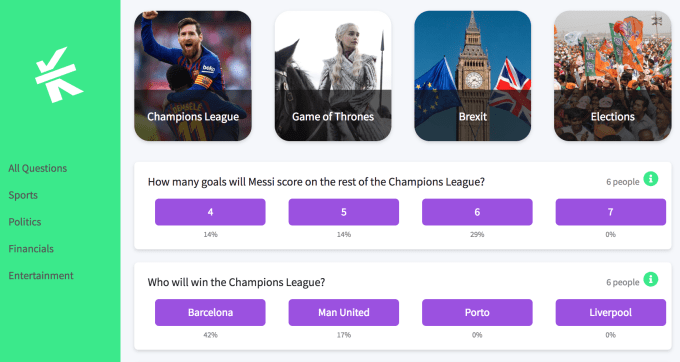
Kalshi: Instead of just betting on sports, Kalshi lets anyone bet on anything, like whether Brexit will happen by the end of the month or who will win an Oscar. Users bet against each other so it’s more like a futures market than gambling, and regulators like it since Kalshi doesn’t earn more when users lose. It already has 2 licenses making it legal in 200 countries and is in talks with US regulators to earn 7 percent transaction fees when people bet.
Volk Wireless: Volk is making an Android smartphone with a free data plan, no carrier required. The co-founders say they’re using long-range wireless hardware to share connections and build a network of phones. Co-Founder Greg Hazel was the Chief Architect at Bittorrent, while co-founder Straya Markovic was the lead engineer at mesh messaging platform Firechat.
Nowports: 50% of shipping containers are lost or delayed in part because of inefficient routing and tracking. Nowports is the Flexport for Latin America, a freight forwarding business that helps pallets of goods get from factory to truck to boat to warehouse to retailer. Started by a third generation freight forwarder, Nowports could succeed where US companies lack the required local understanding.
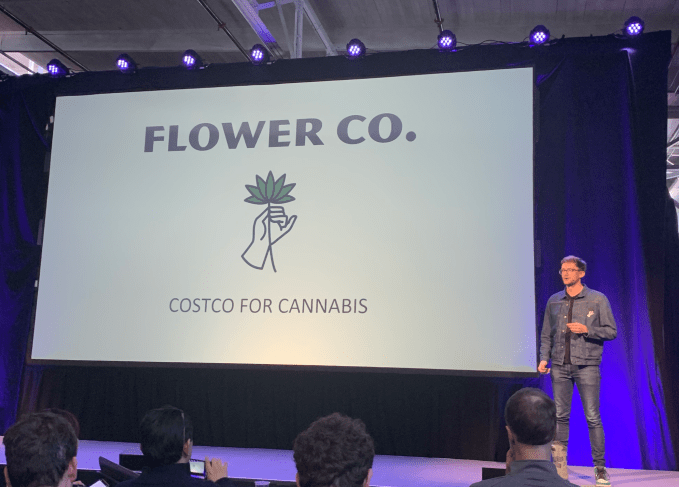
Flower Co.: Memberships for cheaper weed sales and delivery. They’re currently selling $200k in marijuana per month to 700 members. They charge $100 a year for membership, and take 10% on product sales.
Middesk: It’s difficult to know if a business’ partners have paid their taxes, filed for bankruptcy, or are involved in lawsuits. That leads businesses to write off $120 billion a year in uncollectable bad debt. Middesk does due diligence to sort out good businesses from the bad to provide assurance for B2B deals loans, investments, acquisitions, and more. By giving clients the confidence that they’ll be paid, Middesk could insert itself into a wide array of transactions.
Eclipse Foods: Makes dairy product from plants, which they say are “indistinguishable” from those made from animal products. In their tests, 70% of consumers couldn’t tell the difference between their product and a leading competitor. The co-founders were previously the Director of R&D of Hampton Creek and an innovation specialist at the Good Food Institute (a non-profit focusing on plant-based meat/dairy alternatives).

Enemy on Board: By combining the excitement of League Of Legends with the strategy of Mafia, Enemy On Board is a game built for the Twitch era. 5 players team up to complete a mission, but 2 of them secretly are trying to sabotage it. The game’s beta launch is scheduled for June, but testers are already averaging 61 minutes per day, and people have spent 2000 hours watching gameplay on Twitch. Through microtransactions, Enemy On Board’s CEO who worked on League Of Legends believes they can build the next blockbuster freemium game.
Modoo Technology: A wearable for monitoring fetal health, measuring heart rate and baby movements. It has been selling in China for $200 since 2017, with $3.4M in revenue in 2018. The company recently introduced a monthly subscription option for those who don’t want to buy outright.
Our World In Data: World leaders need easy-to-access, understandable data on issues like CO2 emissions or child mortality to make decisions. Our World In Data takes key findings from studies buried in paid journal articles and jargon, and put them on an open access website that has achieved top Google ranking for many queries. It already has 1 million users, and its team from University Of Oxford believes optimizing research data for the web could lead to better global policy.
Encarte: A browser extension bringing one-click checkout to any e-commerce store. Currently supports over 500,000 Shopify stores. It stores your data locally rather than in the cloud, and keeps track of all tracking numbers. They’re also building a “virtual e-commerce credit card” that will offer personalized promotions, amongst other things.
Atomic Alchemy: Radio cardiograms and PET/CT scans require nuclear medicine to visualize abnormalities. But five of the six reactors that generate this nuclear medicine are set to shut down in the next 10 years. Atomic Alchemy builds tiny, privately-owned reactors from off-the-shelf parts in order to generate nuclear medicine. The startup already has letters of intent it estimates are worth $50 million to $100 million, and hopes to be operational by 2024.
Jetpack Aviation: Jetpack is building a flying motorcycle. The company says its jet motorcycle is capable of getting from SF to Mountain View in ten minutes, and fits in a one-car garage. They estimate that their full-scale prototype should be done by the end of the year. They’ve received 9 pre-orders so far, worth about $4.1M in sales. The company’s founders previously built an FAA approved Jetpack called the JB10. We covered Jetpack Aviation on TechCrunch previously here.
Mission Stage:
Trexo Robotics: Trexo Robotics is developing a solution that gives those diagnosed with cerebral palsy a better solution than a wheelchair. The startup is focused on providing a robotics device for children with the disease, and the company’s first product will be available for $1,000 per month to families. The company says they currently have 5 units deployed and are approved for use in the U.S. and Canada.
Pachama: A verified marketplace for carbon credits focused on protecting and restoring the world’s forests. The startups uses machine learning, satellite imaging, drones and LIDAR to offset carbon emissions. Pachama connects carbon buyers — an organization seeking to offset their carbon emissions — to carbon projects.
Saratoga Energy: Over the course of six years, the company has developed and patented a production process to synthesize carbon nanotubes from CO2. The startup sells the carbon nanotubes, which are stronger and lighter than steel, at lower prices to aerospace, battery, concrete and other manufacturers. At the end of the week, the company will deliver their first batch for testing. Saratoga has raised $2 million in grant funding over the last two years.
Cherry: Cherry is an office perks solution for the modern startup. Rather than giving entire swaths of employees the same benefits, the co-founders want to let people choose their favorite internet services. People will be able to select services through a Slackbot interface and get things like ClassPass and HBO paid for by their company. The company says they have 24 companies in paid pilot programs. We previously covered Cherry on TechCrunch here.
CityFurnish: The provider of a furniture rental marketplace in India, CityFurnish delivers and installs furniture to customers in Delhi, Pune, Mumbai and Bangalore for a monthly rental fee, offering free relocation and free maintenance services. The company doesn’t require any contracts and says it’s a cheaper option than actually buying furniture. CityFurnish has 10,000 subscribers today, $3 million in ARR and has been profitable for 18 months.

NaturAll Club: NaturAll Club wants you to refrigerate your haircare products. The startup’s products are made from fruit and vegetable pulp. The team’s first product is made with fresh avocado and did $2 million in sales in 6 months, the company says. While these may sound like Juicero packs for your hair, organic products are the fastest growing product category in beauty.
FlockJay: Operates an online sales academy that teaches job seekers from underrepresented backgrounds the skills and training they need to pursue a career in tech sales. The 12-week long bootcamp offers trainees coaching and mentorship. The company has launched its debut cohort with 17 students, 100 percent of which are already in job interviews and 40 percent of which have already secured new careers in the tech industry.
Demodesk: Demodesk is making a screen sharing tool to help companies reshape sales by demoing products directly for customers. What’s unique is that it isn’t your desktop, it’s a virtual machine where your demo presentation can live without potential customers having to wait through lengthy downloads while still being able to collaborate and edit what’s happening in the software.
Ultralight: A cross-platform app development tool used for rendering HTML UI within games and desktop applications. The company’s goal is to replace Chromium by providing a GPU-accelerated proprietary renderer. Ultralight says it will be compatible with most programming languages.
Keeper: Keeper wants to stop 1099 employees from getting ripped off by minutiae of tax forms. The company says that the average contractor overpays $1,249 per year in taxes. Keeper uses machine learning to automatically find tax write-offs inside the bank statements of users. They’re targeting the 50 million contractors in the U.S. to find their market.

Taobotics: A manufacturer of autonomous robots for supermarkets in China to help brands promote and advertise their products in stores. The startup, which employs a team of robotics experts, says people are 7x more likely to purchase a product from a robot than in-store sales help. Taobotics recently secured a deal to pilot 1,000 robots for Coca Cola.
Releaf: Releaf is building machinery to help African food factories operate more efficiently. The startup says that 90 percent of food factories are running under capacity because they can’t pre-process raw materials quickly enough. The startup says their machines quickly pay off for the factories and are already in use.
Synova Life Sciences: Synova Life Sciences is building a medical device that makes it easier to harvest stem cells from a patient’s fat. The company boasts that its device, which uses “modified shock waves”, can get stem cells from fat 30 times faster than current solutions, while yielding twice as many cells. They’ve already done 45 procedures with 14 different doctors.
Dyneti Technologies: Has invented a credit card scanner SDK that uses a smartphone’s camera to help prevent fraud by over 50 percent and improve conversion for businesses by 5 percent. The business was started by a pair of former Uber employees including CEO Julia Zheng, who launched the fraud analytics teams for Account Security and UberEATS. Dyneti’s service is powered by deep learning and works on any card format. In the two months since it launched, the company has signed contracts with Rappi, Gametime and others.
PreFlight: PreFlight is trying to fully automate UI testing and eliminate the need for companies to hire specifically for QA. The company’s Chrome extension can help developers record user actions and run robust testing. After launching just two weeks ago, users have collectively run 55,000 tests with PreFlight.
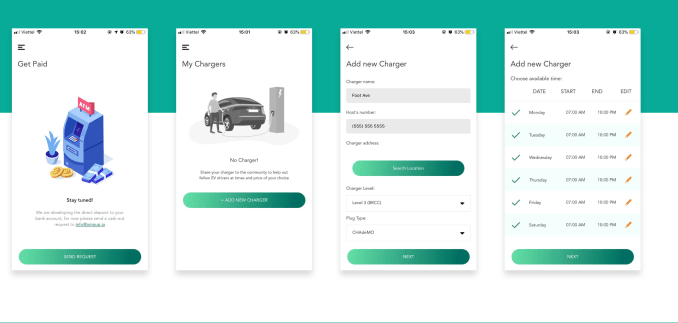
AmpUp: The “Airbnb for electric vehicle chargers.” AmpUp, preparing for a world in which the majority of us drive EVs, operates a mobile app that connects a network of thousands of EV chargers and drivers. Using the app, an electric vehicle owner can quickly identify an available and compatible charger and EV charger owners can earn cash sharing their charger at their own price and their own schedule. The service is currently live in the Bay Area.
Docbot: An AI-enabled computer vision platform for gastroenterology practices to improve colonoscopy procedures. The service, which integrates with IT systems to make billing and documentation more efficient, tracks withdrawal time, intubation rate, bowel prep and adenoma detection rate. 20 million Americans get colonoscopies every year, though doctors aren’t always able to identify the colon polyps which can cause colon cancer. Docbot detects colon polyps in real-time. The service has been used in more than 2,000 procedures to date.
Edyst: Edyst is an online coding bootcamps geared towards college students in India hoping to find employment. The company guarantees that each student that graduates the course will get at least 5 job interviews. Right now, their course is paid for directly by colleges for students. Eventually, the co-founders believe that the bootcamp will be able to replace lower-tier universities in India.
Okteto: An application development platform for Kubernetes that helps developers to quickly iterate and improve their test decision time by 4x. The founders have decades of experience building application platforms for Docker and other businesses. Okteto’s goal is to become the standard way to develop cloud-based applications for Kubernetes.
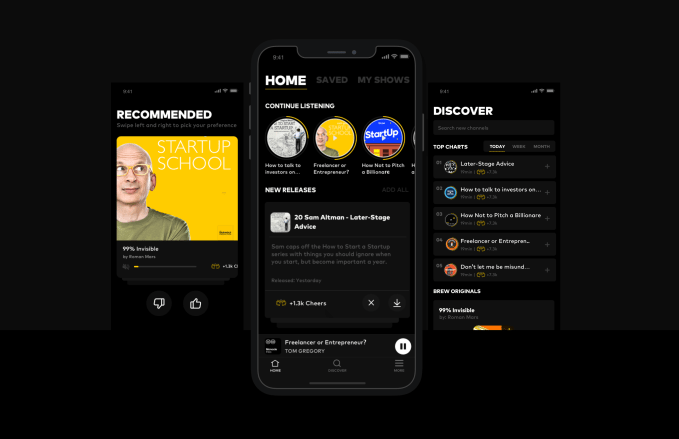
Brew.com: A subscription-based podcasting app tackling the podcast monetization problem. Brew costs users $5 per month and helps creators of all levels earn money for their content by paying them on a per listen basis. The startup launched the app last week with exclusive shows from eight creators, including YouTubers Boogie2988 and Jack Vale, who each have millions of followers on YouTube. Brew currently has 200 creators on its waitlist. We previously covered Brew on TechCrunch here.
Sapling Intelligence: Sapling Intelligence wants to be a Grammarly for the enterprise. The company’s deep-learning writing assistant can help messaging stay on-brand with a uniform voice that can be tuned to approach different audiences. Their product is a browser extension that sits on top of products like Zendesk and Salesforce
Evo.Do: The developer of a codeless test automation tool for the gaming industry and other digital products. The company says its AI-enabled bots are as smart and flexible at identifying bugs in games as a human. The bots are able to find bugs in minutes with no human intervention; one bot works faster and more efficiently than one human tester.
Reelables: Reelables is looking to ensure that enterprise companies lose fewer of their products. The company is building ultra-thin flexible bluetooth trackers that are build into labels that can be affixed to products. The “Tile for enterprise” startup has already launched a pilot program with GE.
Docucharm: The platform, co-founded by former Uber product manager Minh Tri Pham, turns documents into structured data a computer can understand to accurately automate document processing workflows and to take away the need for human data entry. Docucharm’s API can understand various forms of documents (like paystubs, for example) and will extract the necessary information without error. Its customers include tax prep company Tributi and lending businesses Aspire.

Closer Sports: Closer Sports is creating a live-streaming platform for athletes to connect with fans. The co-founders want their product to fill in the shortcomings of ESPN and existing social media services. Unlike Instagram, the startup lets athletes charge for access to their live-streams. The company is kicking things off with UFC fighters and had 500 paid subscribers after launching recently.
Datamode: The startup identifies bugs in businesses’ data pipelines. Debugging is very expensive and time-consuming for data engineering teams. Datamode diagnoses the root cause of pipeline failure showing businesses exactly when it failed and what is broken instantly. Datamode was started by repeat founders, including a co-founder of Movity, which sold to Trulia in 2010.
Schoolable: There are 65 million students in Africa attending private schools, but tuition payments can be a major pain point for parents paying for their child’s education. That’s because tuition payments are often due upfront and it’s more difficult than it should be for schools to keep track of payments. Schoolable is creating an invoicing app that helps ensure parents make payments on time, while also using the app to save directly for tuition.

Vectordash: Dubbing itself the “Netflix for gamers”, Vectordash turns your Macbook Air or other underpowered rig into a formidable machine through their cloud gaming service. Vectordash’s platform allows gamers to play games without rendering them locally, instead utilizing peer-to-peer rendering power via host GPUs. The company is charging $28 per month for the service. We previously covered Vectordash on TechCrunch here.
Doorport: They’ve built a small device that can be added to existing apartment intercom systems, allowing residents to unlock the building’s front door for themselves, guests, and delivery people with an app. Doorport is currently being piloted in San Francisco, Oakland, and New York. The startup is still figuring out exactly how much their product will cost, and are testing different pricing models. We previously covered Doorport on TechCrunch here.
Intact Therapeutics: The makers of smart gels for local drug delivery for gastrointestinal diseases. The company’s gel was created for inflammatory bowel disease but can be used on several other diseases. Intact has already signed a deal with a large pharmaceutical gel maker to develop its products at scale.
Cuanto: Cuanto is building a payment product for Latin American businesses selling their goods on WhatsApp and Instagram, a sales pipeline that 80% of businesses there focus on. The company is planning to use the data they yield from sellers to facilitate loans to businesses in Latin America. The startup is already live in 5 countries.
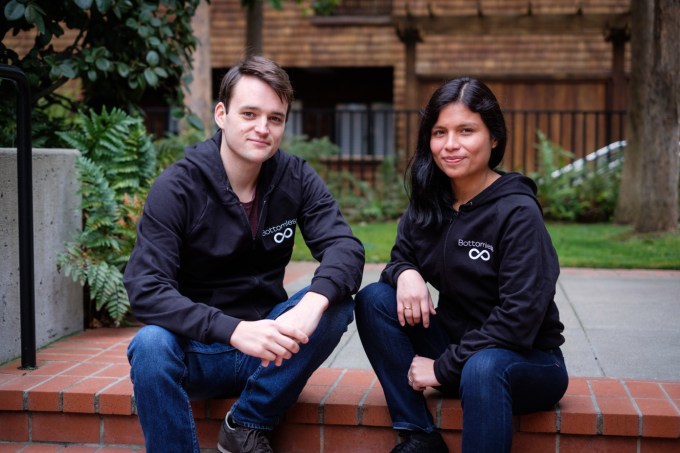
Bottomless: Bottomless automatically restocks your coffee supply using an internet-connected scale which members place under their bag of coffee grounds. Tracking the weight of the bag, Bottomless’ scales determine when customers are low on grounds and ensure a new bag of previously selected freshly roasted coffee is on their doorstep before they run out. The service costs $36 per year. We previously covered Bottomless on TechCrunch here.
Heart Aerospace: The manufacturers of an electric regional airplane, the ES-19, expected to be certified for commercial flights by 2025. The airliners hold 19 passengers. The founder, Anders Forslund, has a Ph.D. in aircraft design and has already signed letters of intent with aerospace companies worth $1.6 billion.
Windsor: Windsor is building a platform that connects a company’s separate application data services. The company connects this data and builds timelines of runtime events, giving customers a closer eye into what is happening on their helping them answer more intimate questions about how their
CareerTu: A WeChat-based online digital marketing school targeting Chinese students living in the U.S. CareerTu wants to help those students who are lacking the necessary skills to succeed in U.S. jobs. In the year since it launched, the startup has brought in $700,000 in revenue from 160,000 users and is profitable. The company plans to expand to support Chinese students based in China.
Convictional: Convictional helps direct-to-consumer companies approach larger retailers more simply. It takes a lot of time for a supplier to build a relationship with a retailer and start selling their products. Convictional wants to speed things up by building a B2B self-service commerce platform that allows retailers to easily approach brands and make orders.
Dockup: Creates on-demand staging environments for engineering teams to save developers’ time. Large companies spend millions to scale staging, including Facebook and Google, while smaller startups are stuck with broken staging. Dockup, which launched this month with four paying customers, will reduce these staging headaches.
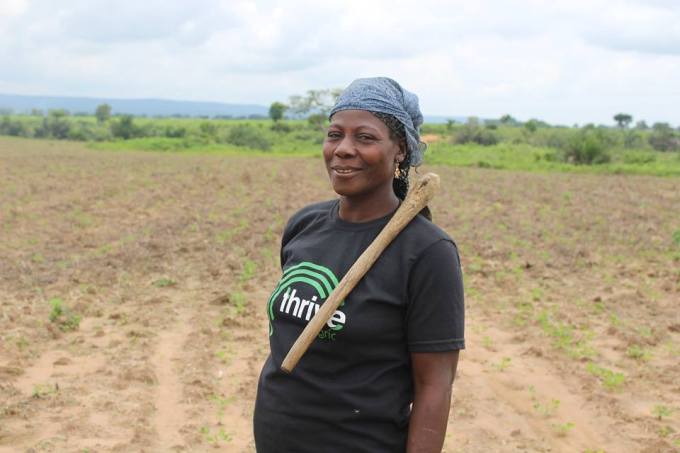
Thrive Agric: The company helps smallholder farmers in Nigeria access crowdfunded loans to help grow their crops, as well as help them sell their produce. The company has worked with 14,000 farmers to date, with plans to reach 1,000,000 farmers across Africa by 2022 in what it says is a $54 billion market opportunity.
Skill-lync: Skill-lync is another YC startup looking to approach the fact that Indian college students aren’t getting jobs in the fields they study. The startup is targeting mechanical engineering students with a set of online courses that can make up for outdated college curriculums. The team is already educating 2,800 students and earning $82,000 in monthly revenues.
Rebank: An automation tool for business banking that works with any bank and/or multiple banks at once. Rebank, which claims to have “hacked banking,” has 40 companies currently using the tool to save time. Rebank operates under a subscription model, charging its customers $50 per month for access to its platform.
AXDRAFT: The startup is building software that helps smaller companies automate documents that they’re having to fill out again and again, helping startups spend less time drafting and proofreading routine documents. The company is starting off with a solution for contracts that helps startups fill out the documents quickly and for free while charging $25 to review the contracts and ensure that everything is up to snuff.
Glide: There has been a pretty major trend towards services that make it easier to build web pages or mobile apps. Glide lets customers easily create well-designed mobile apps from Google Sheets pages. This not only makes it easy to build the pages, but simplifies the skills needed to keep information updated on the site.
Boundary Layer Technologies: High-speed container ships using hydrofoils. The tech-enabled ships allow transit time that is comparable to air travel but much more affordable. The company built its prototype in just 10 weeks at a cost of $150,000 and has a letter of intent from Flexport to build ships that will travel between Los Angeles and Shanghai.
from https://techcrunch.com/2019/03/18/here-are-the-85-startups-that-launched-today-at-y-combinators-w19-demo-day-1/

No comments: